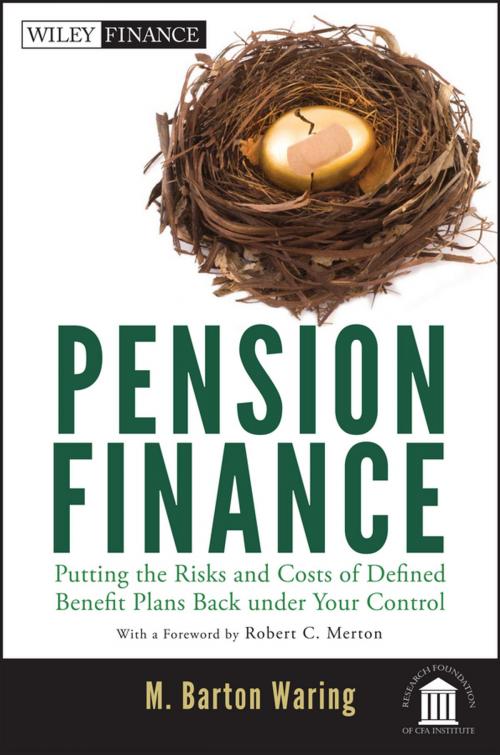Pension Finance
Putting the Risks and Costs of Defined Benefit Plans Back Under Your Control
Business & Finance, Finance & Investing, Investments & Securities| Author: | M. Barton Waring | ISBN: | 9781118138342 |
| Publisher: | Wiley | Publication: | September 13, 2011 |
| Imprint: | Wiley | Language: | English |
| Author: | M. Barton Waring |
| ISBN: | 9781118138342 |
| Publisher: | Wiley |
| Publication: | September 13, 2011 |
| Imprint: | Wiley |
| Language: | English |
Pension plans around the world are in a state of crisis. U.S. plans alone are facing a total accrued liability funding deficit of almost $4 trillion (of the same order of magnitude as the federal debt), a potential financial catastrophe that ranks among the largest ever seen. It has become clear that many government, corporate, and multi-employer pension sponsors will not be able to cope with this crippling debt and may default on promised benefits. And many of those sponsors that might be able to cope are exasperated by continuous, ongoing negative surprises-large unexpected deficits and higher-than-expected required contributions and pension expense-and are choosing to terminate their plans.
But it need not be so. Pension Finance: Putting the Risks and Costs of Defined Benefit Plans Back under Your Control walks the reader through the conventional actuarial and accounting approaches to financing pension benefits and investing plan assets, showing that the problems described happen as a natural consequence of the dated methods still in use. It shows in detail how modern methods based on market value will easily minimize these risks: Pension plans can in fact be comfortable for employers to sponsor and safe for employees to contribute todepend on for their retirement needs.
This book is must-read for defined benefit pension plan sponsors and employee representatives, plan executives, board members, accountants, fund managers, consultants, and regulators., Research sponsored by the CFA Institute, this book demystifies pension finance, previously accessible only to actuaries. It teaches the topic in lay terms by drawing complete analogies to ordinary transactions such as paying off a mortgage or saving for college. Armed with this book, anyone comfortable with finance and investments in any other context can be comfortable with pension finance and pension investment policy. And further armed with a handheld financial calculator, any layperson can quickly estimate the contributions needed to keep a given plan comfortably solvent, giving them a powerful tool for oversight.
Pension plans around the world are in a state of crisis. U.S. plans alone are facing a total accrued liability funding deficit of almost $4 trillion (of the same order of magnitude as the federal debt), a potential financial catastrophe that ranks among the largest ever seen. It has become clear that many government, corporate, and multi-employer pension sponsors will not be able to cope with this crippling debt and may default on promised benefits. And many of those sponsors that might be able to cope are exasperated by continuous, ongoing negative surprises-large unexpected deficits and higher-than-expected required contributions and pension expense-and are choosing to terminate their plans.
But it need not be so. Pension Finance: Putting the Risks and Costs of Defined Benefit Plans Back under Your Control walks the reader through the conventional actuarial and accounting approaches to financing pension benefits and investing plan assets, showing that the problems described happen as a natural consequence of the dated methods still in use. It shows in detail how modern methods based on market value will easily minimize these risks: Pension plans can in fact be comfortable for employers to sponsor and safe for employees to contribute todepend on for their retirement needs.
This book is must-read for defined benefit pension plan sponsors and employee representatives, plan executives, board members, accountants, fund managers, consultants, and regulators., Research sponsored by the CFA Institute, this book demystifies pension finance, previously accessible only to actuaries. It teaches the topic in lay terms by drawing complete analogies to ordinary transactions such as paying off a mortgage or saving for college. Armed with this book, anyone comfortable with finance and investments in any other context can be comfortable with pension finance and pension investment policy. And further armed with a handheld financial calculator, any layperson can quickly estimate the contributions needed to keep a given plan comfortably solvent, giving them a powerful tool for oversight.















